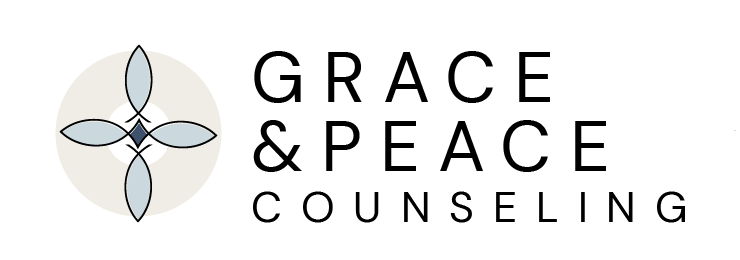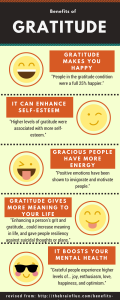“…life change comes when we receive life with thanks and ask for nothing to change.”
― Ann Voskamp, One Thousand Gifts: A Dare to Live Fully Right Where You Are
It seems that gratitude is the new buzzword. We see catchy titles on our newsfeeds: The Secret to Success: Gratitude, 5 Easy Steps to Gratitude, Gratitude for Dummies. But what is the big deal? Is gratitude really helpful? And what is gratitude anyway?
Merriam-Webster defines gratitude as:
grat·i·tude /ɡradəˌt(y)o͞od/
noun
the quality of being thankful; readiness to show appreciation for and to return kindness.
Does being thankful, showing appreciation, and being kind lead to feeling better and an increased sense of contentment in life? Research indicates that yes, gratitude really does make a difference in our lives. (http://thebrainflux.com/benefits-gratitude/).
What kind of difference does practicing gratitude make? Here are some of the benefits:
- life satisfaction
- optimism
- self-control
- kindness
- forgiveness
- resilience
- social connection
- intimate relationship satisfaction
- physical health/immunity
- productivity
- leadership ability
Decreased:
- sleep problems
- comparison and envy
- aggression
- self-centeredness
- materialism
- anxiety
- marital problems
- blood pressure
- stress
- depression
If I give thanks for things, I feel better? At first glance, it feels too simple to actually be of any benefit. However, the research on gratitude is clear. Gratitude changes things. I’ve seen the practice of gratitude change my own life as well as the lives of clients. When you begin to actively and intentionally practice gratitude, you begin to see things differently. And those small differences begin working change.
Maybe you’d like to give gratitude a try, but you aren’t sure where to begin. It’s as simple as getting a notebook. Writing in a physical notebook is best. There is something about putting pen to paper that helps to transfer ideas to our long-term memory. “In fact, writing by hand appears to improve our ability to remember things, meaning even in today’s tech-obsessed society, the pen just might be mightier than Word.” (https://www.huffingtonpost.com.au/2016/04/21/writing-by-hand-benefits_n_9735384.html).
To begin, start small. At the end of each day, simply make a list of 3 things that you are grateful for. The list does not have to include anything earthshattering. For example:
- The glow of the sunrise on the mountain.
- A baby laughing at his dad making silly faces.
- The smell of clean sheets.
Because you are keeping a list, you will start to notice more and more things to be grateful for. Some days, your list will expand beyond 3 things. Other days, it will be a struggle to find the 3 things. That’s okay. Do it anyway. The intentional practice of writing down 3 things each day, no matter if the day was good or bad, is what begins to work change.
Like any new habit, it takes time to notice the changes. You are growing your thankfulness muscle. When you begin an exercise program, you don’t expect to see results right away. The same is true for any new thing we learn. It takes time for the seed to sprout and take root. By writing down 3 things each day, you are watering the seed. Soon, you will see leaves start to grow. The more you practice, the bigger and stronger your thankfulness tree will become.
I personally found the book One Thousand Gifts: A Dare to Live Fully Right Where You Are by Ann Voskamp, helpful in beginning my gratitude journey.

